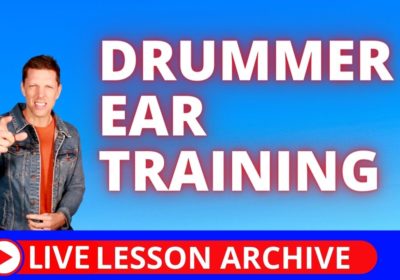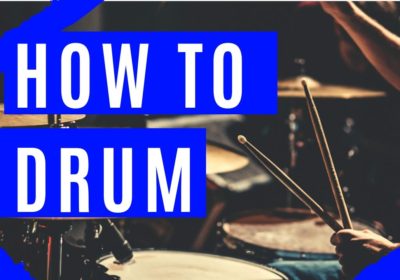Eight time management tips to help you get the full potential from your drum practice
This is a time management chapter taken from my book titled Drum Kit Secrets: 52 Performance Strategies for the Advanced Drummer (Music Secrets for the Advanced Musician).
Modern life is hectic, time is a valuable commodity and most of us would like more of it. But most of us have also been guilty of procrastinating and time wasting at some point. This can greatly reduce our development as a drummer if vast periods of potential practice time are squandered.
My typical week involves a combination of performances, rehearsals, recording sessions, writing articles, teaching and preparation. Much of this is scheduled with a very strict deadline and somewhere amongst it I have to make sure I’m ready for each commitment, not to mention family time and other leisure activities.
If we carefully plan our time, set our goals and see the plan through, we can optimise how that time is spent and therefore develop much more effectively as musicians. Whilst everyone works in slightly different ways, giving your practice sessions structure will vastly improve your efficiency.
 Here are some tips to help your drum practice time management and achieve great things on the kit:
Here are some tips to help your drum practice time management and achieve great things on the kit:
- Plan practice sessions in your diary and don’t let them slip away
Having set periods for practice in your diary means that you are much more likely to carry out those practice sessions. That is your designated time to completely focus on that task. Leave any other issues at the door and allow your body and mind to optimise that time for developing your playing.
- Don’t multitask
We often multitask in life. Although making a cup of tea whilst cooking dinner and carrying out a phone conversation might be a great time saver, trying to practise several things at once results in no single aspect being given the full focus that it needs to acquire the necessary level of performance required at a professional level. Break your practice session into sections and use each section to concentrate on a single technique, passage of music, etc. This way you will retain the information and body movements to a greater extent.
- Prioritise!
Practise the most important (and most difficult) exercises first. This is the time when you are freshest, most inspired and motivated. If you have a gig tomorrow, learn that material before anything else.
- Capitalise on free time
Down time in the hotel whilst on tour, coffee breaks between teaching, the dressing room before a show; These are all moments that we can use to work on new material if you are properly equipped. Take a practise pad, manuscript paper, and sticks wherever you go and every spare moment becomes a practice session.
- Banish distractions – Facebook, emails, Twitter, etc
Distractions are everywhere. You have instant access to texts, emails, social media sites and much more via your computer, tablet and mobile phone. And with the cheery notification ping that these devices provide, even tucked away in your bag, they still let you know when something has come through. But stop and think; do you really need to break your concentration only to find out through Facebook that Aunty Ethel has just baked an amazing apple crumble? Probably not. Turn all devices off, find an isolated space away from family and friends, close the door and fully commit your mind and body to your practice. The rewards will be great.
- Find your most productive time of the day and use it
Some of us are night owls; some early birds. Try to identify when you are naturally most productive and, where possible, plan your practice sessions for then. Of course if, like me, you come alive close to midnight, drumming might not go down well with the neighbours. But where possible, use your naturally motivated moments to create greater gains in the sessions.
- Set very clear SMART goals
This acronym is a useful way to keep yourself on track. I am definitely prone to setting myself unrealistic targets for the time I have available. The result is either poor quality, rushed work, or achieving none of the goals because I was overwhelmed. By using the SMART system, you will have a very clear idea of what needs to be achieved and how to go about it.
S – Specific. Unambiguous goals are crucial. You might have a piece to learn for a performance next week. This goal is clear. But sitting down to practice simply to become a better drummer might leave you overwhelmed with the numerous techniques and disciplines available to a drummer. That isn’t to say that just sitting at the kit and playing for pure enjoyment is a waste of time, on the contrary, this is important and great fun. But when you have time pressure for an upcoming performance, exam, or audition, make sure you set specific goals in order to be ready.
M – Measurable. The goal, ‘To be an amazing drummer’ is difficult to really quantify. Being amazing is subjective. When will you know you’re amazing? And along the way, you will have years of disappoint whilst you’re not amazing in your eyes. Smaller, more frequent successes will keep you highly motivated, and being measurable makes it easy to know when to give yourself a pat on the back. An example might be that you want to play even semiquaver double strokes at 200bpm. This is easy to determine when you have achieved it.
A – Attainable. It is important that you are stretching yourself, but not to the point of creating inevitable failure. This will destroy your motivation. Be realistic and break tasks into manageable chunks. Don’t set out to learn Alan Dawson’s Rudimental Ritual in a day. Aim to learn the first four bars to a high standard. Then the next day learn the next four bars. Each mini success will spur you on and you have a greater chance of reaching the ultimate goal of playing the whole piece.
R – Relevant. I have certainly sat at the kit in the past to learn a set for a gig the next day, but then succumbed to the desire to learn a tricky but totally unrelated foot ostinato, only to realise that after two hours I still don’t know the set for the impending gig and my practice session is over! Keep focused on the relevant tasks that need to be achieved.
T – Time-based. An open ended goal will often get overtaken by other flights of fancy or pressing issues. When setting a goal, set a clear deadline, even if one doesn’t really exist. To use the Rudimental Ritual example again; rather than deciding to learn the rudimental ritual at some point in time, pick a realistic time limit, for example four weeks, and then go for it. This will keep you motivated and focused. It also allows you to plan how many sessions you will have in four weeks, and therefore what your mini goals will be for each individual session.
- Take breaks
This may seem counter-intuitive to some; we are trying to achieve more so taking time away from that task must surely slow us down. But the truth is that regular short breaks allow us to maintain a high level of concentration and focus on the task at hand. The break might be getting a drink, doing stretches, or just walking away from the drums for a minute. After this minute or two you will return to the drums with renewed vigour. If on the other hand you slavishly sit at the kit for hours on end, not only might you suffer physical symptoms such as an aching back or sore arms, but your mental capacity will also diminish so that the time spent will decrease in productivity as time goes on. Your timing may suffer, your focus on the material that you are practising may suffer, your ability to remember parts or even the speed at which you learn them may suffer.
To take this even further you might like to get 10 top tips for effective drum practice.
As you love drumming, you may want to browse the other lessons available at Total Drummer. Check out the free lessons, single lessons, mini courses and main courses, as well as the drum less playalongs and the charts of famous songs.
Faster Hands in 7 Days FREE Drum Course
Improve your drum hand speed in a week to get Faster Hands
We all want faster hands on the drums but so many drummers I see are missing the basic aspects of drumming that will take them to the next level.
Many of those drummers are not lazy. In fact it’s the opposite. They are putting in the work but they are missing the fundamental techniques that will allow them to play faster and smoother. This leads to inevitable frustration and despondency.
In effect they are wasting their time!
By clicking below you can gain access to a FREE ‘7 days to faster hands’ drum course that will guarantee to raise your speed by the end or your money back (yes it is free so not the best guarantee ever!). But seriously, it will make a difference in a really short space of time.
But more than trying to create unrealistic miracles in a short space of time, it will also set up long term habits that will help you find your full potential as a drummer long into the future. And that is way more important.
It will show you:
- The fundamental techniques to play at your best level
- How to properly grip the sticks
- How to prepare yourself properly to drum
- How to make the stick do the work so you don’t have to
- How to set your drums up for optimum speed
- How to apply this around the kit
- Exercises to develop control as well as speed
- How to take this on into the future to become awesome!
And more than that you will also get a ton of other great free drum resources to make you a better drummer such as playalong tracks, articles, exclusive video lessons and more. And it’s all free!
Watch the video to get a feel for what the seven day course entails and then scroll down to get the course immediately.
Start today and build your hand speed up
So let’s start the course today. Do it now and begin your 7 day process to get faster hands. This time next week you’ll be enjoying the results and thinking about how you can take it to the next stage (by the way, the course helps with that too as we’ll be checking speed progress over the next 12 months).



